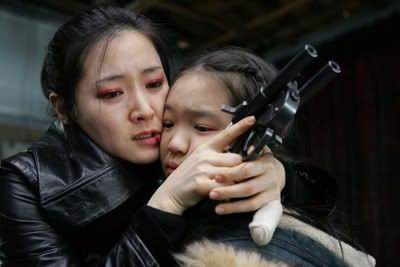
I'll be honest and say I'm not sure I totally get everything about this film, but hopefully the discussions can fulfill something. My initial thoughts:
Lady Vengeance, if taken somewhat out of context from her brother films, is less about vengeance and more about attrition and redemption. Lee Geum-ja serves prison time, yet unknown to us is her proven guilt of murdering a child, but uses the time to befriend her prison mates. Seemingly superficial relationships is what Lee uses to pave her way towards her goal, which is to hold accountable those who wronged her. By the way, the actual criminal threatened Lee’s newborn daughter if she didn’t confess to the murder.

It starts off like a fairly typical revenge thriller in that sense, but the film isn’t content with what would be a tired sequence of events. Lee becomes so overcome with her plan that the film now follows a hallucinatory pace; it’s as if Amelie married a murderous Lewis Carroll. The pace, Lee turning into a stoic, graphic novel vigilante, and the juxtaposition of her exhibited emotions with the gorgeous mise-en-scene, are what turn the movie on its head. Another by-the-way, the real child murderer is a preschool teacher now.

A couple things to consider deeper: her daughter, now a teen adopted into Australia, doesn’t speak Korean. The way the film utilizes this language gap is brilliant, and the growth of their relationship later on is wrenching, but another bold move is taken when Lee gives up her retribution to the parents of the dead children. Does it take away from her sympathy, transferring our emotions to the parents, despite their violent reactions under Vivaldi music? Despite her coldness, she still did many good things to people, so was she misinterpreting her path?

Struggles between Christianity and Buddhism, the bumpy quest out of dishonor, the power of a woman in this society, the 12-Angry-Men approach to turning revenge into purity, the dithering of responsibility, the inevitable alteration of person for better or worse; when art tells us nothing is black and white, then fades to black and white, what can we make of any of these convictions? Perhaps a quote from Bruno Bettelheim will incite something:
“The fairytale is therapeutic because the patient can find their own solution through contemplating what the story seems to imply about them and their conflicts. Fairytales direct us to discover as a child and rediscover as an adult our identities and calling. They intimate that a rewarding good life is within reach despite adversity but only if one does not shy away from hazardous struggles without which no one can ever achieve true identity.”

Last edited by wintertriangles; 12-07-12 at 03:49 PM.



